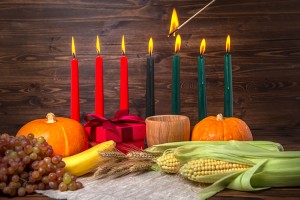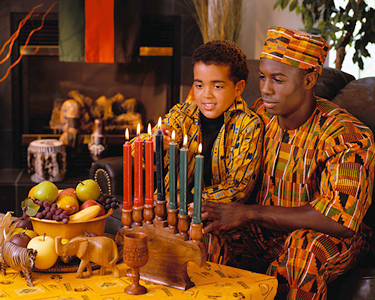Have a Safe and Happy Kwanzaa!
Monday, December 21st, 2020Saturday, December 26, marks the first day of the holiday Kwanzaa. The holiday was developed in 1966 in the United States by Maulana Karenga, a professor of Pan-African studies and Black cultural leader. The holiday centers on the Nguzo Saba, seven principles of Black culture developed by Karenga. These principles are Umoja (unity), Kujichagulia (self-determination), Ujima (collective work and responsibility), Ujamaa (cooperative economics), Nia (purpose), Kuumba (creativity), and Imani (faith). Kwanzaa is seven days long, lasting from Saturday through Friday, January 1.
The word Kwanzaa, sometimes spelled Kwanza, comes from the phrase matunda ya kwanza, which means first fruits in Swahili (also called Kiswahili), an East African language. There are seven basic symbols of Kwanzaa: mazao (the fruits of the harvest), the mkeka (a mat on which they are arranged), the kinara (a candleholder), mishumaa saba (candles), muhindi (ears of corn, one for each child in the family), the kikombe cha umoja (the chalice of unity), and zawadi (gifts). The zawadi that families exchange are often homemade. Each evening, families light one of the seven candles in the kinara and discuss the day’s principle.
Near the end of the holiday, there is a feast called karamu. It features traditional foods, ceremonies honoring the ancestors, assessments of the old year and commitments for the new, performances, music, and dancing.
Like so many holidays this year, Kwanzaa might look different than in years past. For instance, the entire community usually gathers for karamu. But, in many places, efforts are being made to prevent the spread of the pandemic (global outbreak) of the coronavirus disease COVID-19. Such efforts often include social distancing, meant to limit contact among people and thus the spread of germs. But, limiting the spread of germs doesn’t mean you can’t have seven days of joy!
One socially distant way to celebrate the holiday is to have a virtual dance party with friends and family. Performances, music, and dancing are important parts of karamu. So, choreograph a dance with the people in your household and send a video to friends and family. Your friends and family can learn the dance, too! If you must visit friends or relatives, wash your hands or use hand sanitizer before and after greeting others. Wearing a protective face mask when not eating can help prevent the spread of disease. However you choose to celebrate, we hope you have a safe and fun Kwanzaa!




